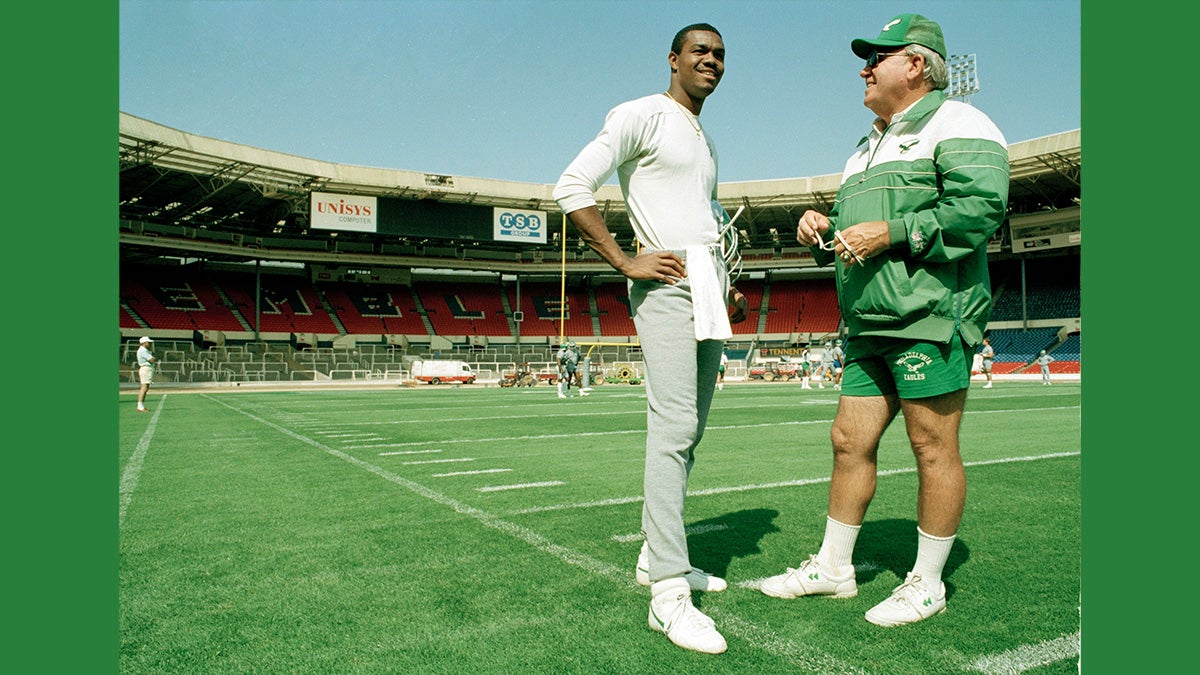Former Eagles coach, sharp-tongued defensive guru Buddy Ryan dies at 85

Randall Cunningham, quarterback for the Philadelphia Eagles talks with head coach Buddy Ryan during a light training session, Aug. 5, 1989, at London's Wembley Stadium where they took on the Cleveland Browns for the 1989 American Bowl. (AP Photo/Gillian Allen)
In today’s NFL world of high-flying, pass-first offenses, defense isn’t really considered sexy. But few would deny that Buddy Ryan elevated that half of the game into an art form.
The Philadelphia Eagles’ former coach, the fiery and blustery Ryan, died Tuesday. He was 85 and his health had deteriorated following a bout with cancer and a stroke in recent years. Eagles’ fans remember Ryan not just for embodying the city’s blue-collar style, but for winning football games with stifling, relentless defense.
“There has never been a better defensive coordinator than James David Ryan,” said longtime Eagles broadcaster Merrill Reese, a close friend of Ryan. “He took a franchise that was in the drain, in the gutter, and just dug it out piece by piece.”
Ryan’s defensive schemes were a response to new NFL rules that made it easier to pass the ball and harder to defend it. That’s according to David Plaut, senior producer at NFL Films and co-author of “The Games that Changed the Game: The Evolution of the NFL in Seven Sundays.”
“Buddy Ryan, being the defensive genius that he was, came up with different schemes where he would be able to pressure the quarterback in unconventional ways,” said Plaut.
He did that, Plaut said, by moving players around on the defensive line and blitzing with sometimes as many as eight defenders — a novel tactic in the mid-’80s, and one that confused blockers.
“Instead of knowing, ‘I’m going to block this guy, and I’m going to block him pretty much on every play,’ now they were blocking a different guy on almost every play,” said Plaut.
Ryan’s defenses were big, aggressive, and loaded with talent. They featured the likes of Hall of Famer Reggie White, Seth Joyner, Clyde Simmons, Eric Allen, and Jerome Brown.
“They were not only smart defenses, but they were physically intimidating,” said Plaut. “There were games that Ryan coached where even an Eagles fan, the most diehard fanatic, would be fearful of the health of the opposing team’s quarterback.”
Case in point: a 1990 game against the Washington Redskins so brutal it was dubbed the “Body Bag Bowl.”
“So many players were injured on the Redskins because of the aggressiveness of Ryan’s defense, that players had to be removed,” said Plaut. “By the end of the game, I think they had either a receiver or a running back quarterbacking the team because there was nobody left.”
In another, dubbed the “Bounty Bowl,” an Eagles linebacker was supposedly given a financial reward to take out the opposing kicker. Reese has his doubts about that story.
“Some said it happened, some said it was just the fact that they were told to go out and play aggressive football,” he said. “We’ve seen things like that over the years. Some panned out to be true, some weren’t.”
During his time as head coach, Ryan took the team to three playoff appearances, but each time the Eagles were eliminated in the first round. Critics say his inattention to offense and inability to exploit the athletic talent of his star quarterback, Randall Cunningham, led to his firing in 1991. Plaut says there’s some evidence for that.
“When you get to the playoffs, and your competition is as good or better than you are, you need to be a team in full, and that was a criticism leveled against him,” said Plaut. “And if you go strictly by the bottom line, how many playoff games did Buddy Ryan win, you have to say there is at least some merit to the idea that having so much emphasis on your defense and not really being as attentive to your offense can really hurt you in the long run … But when you look at his overall contributions, his innovation, his ideas, and when he did it, he is among the most influential figures in modern pro football history.”
Ryan himself blamed the firing on personality clashes with team owner Norman Braman. The characteristically blunt Ryan summed it up this way to a reporter in 1991.
“I think it was because probably that they were the Buddy Ryan Eagles,” he said, “…and Norman Braman gave $60 million for them and I think he wanted [them] to be the Norman Braman Eagles, which you can’t blame him, but I think that had a lot to do with it. I think it was an ego situation.”
Maybe the most punishing and merciless display by Ryan’s team occurred not on the field, but in a recording studio, where the ’88 squad ‘rapped’ an ode to their coach.
WHYY is your source for fact-based, in-depth journalism and information. As a nonprofit organization, we rely on financial support from readers like you. Please give today.

